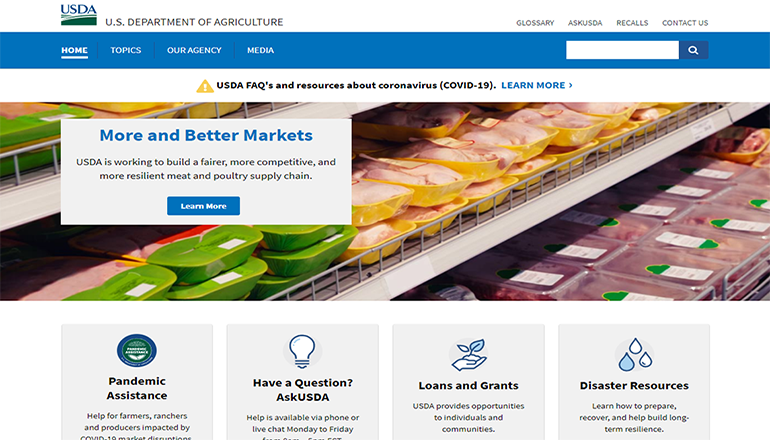Agriculture Secretary Tom Vilsack and Deputy Secretary Xochitl Torres Small, representatives of the Biden-Harris Administration, recently unveiled a series of investments aimed at bolstering market access and revenue streams for producers while strengthening the food system and improving consumer access to locally grown and healthier foods. This announcement is part of President Biden’s Investing in America agenda, which aims to create transformative economic opportunities for families and businesses nationwide.
The U.S. Department of Agriculture (USDA) has revealed plans to establish 17 new Urban Service Centers and ten urban county committees, with an investment of approximately $10.7 million in the Patrick Leahy Farm to School Program. Furthermore, there will be an expansion of the Healthy Food Financing Initiative, with approximately $30 million in funding for the new Local and Regional Healthy Food Financing Partnerships Initiative.
Secretary Vilsack expressed, “Through President Biden’s Investing in America agenda, we are growing local economies and building resilient communities, whether rural or urban, in every corner across the country.” The administration is determined to support urban communities by providing increased market opportunities for small and mid-sized producers, reinforcing the national and local food systems, and investing in urban agricultural operations. This move is expected to result in healthier food options produced closer to home, benefiting both families and farmers.
The recent announcements serve as a testament to the Biden-Harris Administration’s commitment to its Investing in America agenda and Bidenomics strategy, aiming to foster local economies from the middle out and bottom up while creating more resilient and healthier communities nationwide. Additionally, the investments in the HFFI Partnerships Program and Farm to School Program align with the administration’s National Strategy on Hunger, Nutrition, and Health.
Deputy Secretary Torres Small emphasized the importance of equitable access to healthy food, stating, “Families should have access to healthy, locally grown food no matter where they live, and farmers should be able to access profitable markets and revenue streams regardless of their zip code.” This investment reaffirms the administration’s dedication to supporting farmers of all sizes across the nation, enabling them to thrive and continue producing nutritious food for families.
The Background on Urban Agriculture reveals USDA’s efforts to support urban farmers by establishing 17 new Urban Service Centers, staffed by Farm Service Agency (FSA) and Natural Resources Conservation Service (NRCS) employees. These centers will offer various programs, including farm loans, conservation, disaster assistance, and risk management. Additionally, 10 new urban county committees will be established to assist in the local administration of FSA programs.
To reinforce the Urban Service Centers and urban county committees, the USDA will invest $40 million in partnerships with community-based organizations, thanks to the support of President Biden’s American Rescue Plan. These partnerships include collaborations with local organizations to conduct outreach, education, and technical assistance, Virginia State University’s Small Farm Outreach Program, and Cornell University’s Small Farm Center to provide guidance and training on the assistance needed by urban producers. Furthermore, collaborations with To Improve Mississippi Economics, Inc. (TIME, Inc) will fund partnerships with community-based organizations in 10 cities where urban county committees are being created in 2024.
The USDA has been actively supporting urban agriculture through various initiatives, such as investing in Urban Agriculture and Innovative Production competitive grants, Composting and Food Waste Reduction (CFWR) cooperative agreements, and renewing the People’s Garden movement. The agency also invests in urban agriculture and urban food systems projects through the Agricultural Marketing Service’s Local Agriculture Market Program (LAMP).
The Farm to School Grants program by USDA’s Food and Nutrition Service (FNS) has awarded $10.7 million to 103 projects across the country. These investments aim to provide 1.2 million children from nearly 3,000 schools in 40 states and Guam with access to nutritious and tasty foods while supporting local farmers and producers. The program also seeks to reach historically underserved and marginalized communities, promoting nutrition security for children. Since its inception in 2013, the Farm to School Grant Program has provided $75 million in funding across the nation, benefiting over 25 million students in more than 59,000 schools.
In addition to the grantmaking efforts, USDA is partnering with the National Farm to School Network to support its Racial Equity Learning Lab, set to launch in Fall 2023. The Learning Lab’s first cohort will consist of a diverse group of advocates within the farm to school community, committed to integrating racial equity into farm to school operations.
The Biden-Harris Administration’s investment in agriculture represents a significant step towards creating a more robust and sustainable food system while enhancing access to healthy choices for all Americans.


